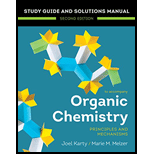
Organic Chemistry: Principles And Mechanisms: Study Guide/solutions Manual (second)
2nd Edition
ISBN: 9780393655551
Author: KARTY, Joel
Publisher: W. W. Norton & Company
expand_more
expand_more
format_list_bulleted
Concept explainers
Question
Chapter 2, Problem 2.19P
Interpretation Introduction
Interpretation:
Out of methanol and
Concept introduction:
Solubility depends on intermolecular interactions. Both the intermolecular interactions of the solute that would get disrupted on dissolution with the given solvents and the intermolecular interactions in the solution decide the solubility of the solute. When there are two polar solvents, the solvent with the greater dipole moment will better able to solvate the ions.
Expert Solution & Answer
Want to see the full answer?
Check out a sample textbook solution
Students have asked these similar questions
Formula
BaF₂
PbF2
SrF₂
CaF₂
+
Which of the following salts would have the lowest solubility in water?
Ksp
1.7 x 10-6
3.6 x 10-8
4.3 x 10-9
3.5 x 10-11
F6
F7
8
A) BaF₂
B) PbF₂
C) SrF₂
D) CaF₂
1-
2-
3-
Problem #2 How many grams of glycol ( C2H6O2 ), an antifreeze, must be added to 2 liters of water ( density of water = 1 g / mL) to lower the freezing point of water to – 10°C.
Chapter 2 Solutions
Organic Chemistry: Principles And Mechanisms: Study Guide/solutions Manual (second)
Ch. 2 - Prob. 2.1PCh. 2 - Prob. 2.2PCh. 2 - Prob. 2.3PCh. 2 - Prob. 2.4PCh. 2 - Prob. 2.5PCh. 2 - Prob. 2.6PCh. 2 - Prob. 2.7PCh. 2 - Prob. 2.8PCh. 2 - Prob. 2.9PCh. 2 - Prob. 2.10P
Ch. 2 - Prob. 2.11PCh. 2 - Prob. 2.12PCh. 2 - Prob. 2.13PCh. 2 - Prob. 2.14PCh. 2 - Prob. 2.15PCh. 2 - Prob. 2.16PCh. 2 - Prob. 2.17PCh. 2 - Prob. 2.18PCh. 2 - Prob. 2.19PCh. 2 - Prob. 2.20PCh. 2 - Prob. 2.21PCh. 2 - Prob. 2.22PCh. 2 - Prob. 2.23PCh. 2 - Prob. 2.24PCh. 2 - Prob. 2.25PCh. 2 - Prob. 2.26PCh. 2 - Prob. 2.27PCh. 2 - Prob. 2.28PCh. 2 - Prob. 2.29PCh. 2 - Prob. 2.30PCh. 2 - Prob. 2.31PCh. 2 - Prob. 2.32PCh. 2 - Prob. 2.33PCh. 2 - Prob. 2.34PCh. 2 - Prob. 2.35PCh. 2 - Prob. 2.36PCh. 2 - Prob. 2.37PCh. 2 - Prob. 2.38PCh. 2 - Prob. 2.39PCh. 2 - Prob. 2.40PCh. 2 - Prob. 2.41PCh. 2 - Prob. 2.42PCh. 2 - Prob. 2.43PCh. 2 - Prob. 2.44PCh. 2 - Prob. 2.45PCh. 2 - Prob. 2.46PCh. 2 - Prob. 2.47PCh. 2 - Prob. 2.48PCh. 2 - Prob. 2.49PCh. 2 - Prob. 2.50PCh. 2 - Prob. 2.51PCh. 2 - Prob. 2.52PCh. 2 - Prob. 2.53PCh. 2 - Prob. 2.54PCh. 2 - Prob. 2.55PCh. 2 - Prob. 2.56PCh. 2 - Prob. 2.57PCh. 2 - Prob. 2.58PCh. 2 - Prob. 2.59PCh. 2 - Prob. 2.60PCh. 2 - Prob. 2.61PCh. 2 - Prob. 2.62PCh. 2 - Prob. 2.63PCh. 2 - Prob. 2.64PCh. 2 - Prob. 2.65PCh. 2 - Prob. 2.66PCh. 2 - Prob. 2.67PCh. 2 - Prob. 2.68PCh. 2 - Prob. 2.69PCh. 2 - Prob. 2.70PCh. 2 - Prob. 2.71PCh. 2 - Prob. 2.72PCh. 2 - Prob. 2.1YTCh. 2 - Prob. 2.2YTCh. 2 - Prob. 2.3YTCh. 2 - Prob. 2.4YTCh. 2 - Prob. 2.5YTCh. 2 - Prob. 2.6YTCh. 2 - Prob. 2.7YTCh. 2 - Prob. 2.8YTCh. 2 - Prob. 2.9YTCh. 2 - Prob. 2.10YTCh. 2 - Prob. 2.11YTCh. 2 - Prob. 2.12YTCh. 2 - Prob. 2.13YTCh. 2 - Prob. 2.14YTCh. 2 - Prob. 2.15YTCh. 2 - Prob. 2.16YTCh. 2 - Prob. 2.17YTCh. 2 - Prob. 2.18YTCh. 2 - Prob. 2.19YTCh. 2 - Prob. 2.20YT
Knowledge Booster
Learn more about
Need a deep-dive on the concept behind this application? Look no further. Learn more about this topic, chemistry and related others by exploring similar questions and additional content below.Similar questions
- Which of the following compounds is most soluble in water? Hint: you need to solve for [x] and then decide. BaSO4 Ksp = 1.98x10-10 Fe(OH)2 Ksp = 1.64x10-14 Ag3PO4 Ksp = 1.2x10-15arrow_forwardWhich of the following will have the greatest solubility in water? Which will have greatest solubility in ethyl acetate (an organic solvent)? HO зас Select one: NH₂ منشود III CH₂ a. I in water and IV in ethyl acetate H₂C H₂C HO HO HO OH HO II IV NHarrow_forwardwhy is cyclohexene soluble in H2SO4? please cite referencearrow_forward
- 19. In which set are the substances arranged in order of decreasing solubility in water?arrow_forwardi cant figure out what would dissolve best in CCL4 the choices i have are NaCl, water, CH3CH3, or HFarrow_forwardCan you help me? I chose gas becomes less soluble and gas is independent of temp changes. Problem is attached.arrow_forward
arrow_back_ios
SEE MORE QUESTIONS
arrow_forward_ios
Recommended textbooks for you
 Chemistry: The Molecular ScienceChemistryISBN:9781285199047Author:John W. Moore, Conrad L. StanitskiPublisher:Cengage Learning
Chemistry: The Molecular ScienceChemistryISBN:9781285199047Author:John W. Moore, Conrad L. StanitskiPublisher:Cengage Learning Chemistry: Principles and ReactionsChemistryISBN:9781305079373Author:William L. Masterton, Cecile N. HurleyPublisher:Cengage Learning
Chemistry: Principles and ReactionsChemistryISBN:9781305079373Author:William L. Masterton, Cecile N. HurleyPublisher:Cengage Learning Chemistry: Principles and PracticeChemistryISBN:9780534420123Author:Daniel L. Reger, Scott R. Goode, David W. Ball, Edward MercerPublisher:Cengage Learning
Chemistry: Principles and PracticeChemistryISBN:9780534420123Author:Daniel L. Reger, Scott R. Goode, David W. Ball, Edward MercerPublisher:Cengage Learning

Chemistry: The Molecular Science
Chemistry
ISBN:9781285199047
Author:John W. Moore, Conrad L. Stanitski
Publisher:Cengage Learning

Chemistry: Principles and Reactions
Chemistry
ISBN:9781305079373
Author:William L. Masterton, Cecile N. Hurley
Publisher:Cengage Learning

Chemistry: Principles and Practice
Chemistry
ISBN:9780534420123
Author:Daniel L. Reger, Scott R. Goode, David W. Ball, Edward Mercer
Publisher:Cengage Learning